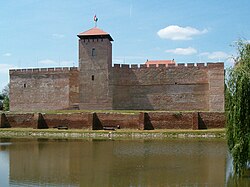Gyula, Hungary
| Gyula | ||
|---|---|---|
| Town | ||

Gyula Castle
|
||
|
||
| Coordinates: 46°39′N 21°17′E / 46.650°N 21.283°ECoordinates: 46°39′N 21°17′E / 46.650°N 21.283°E | ||
| Country | Hungary | |
| County | Békés | |
| Area | ||
| • Total | 255.8 km2 (98.8 sq mi) | |
| Population (2011) | ||
| • Total | 31,067 | |
| • Density | 121.5/km2 (315/sq mi) | |
| Time zone | CET (UTC+1) | |
| • Summer (DST) | CEST (UTC+2) | |
| Postal code | 5700, 5711 | |
| Area code(s) | 66 | |
Gyula (Hungarian pronunciation: [ˈɟulɒ], German: Jula, Romanian: Jula or Giula, Turkish: Göle) is a town in Békés County, Hungary. The town is best known for its Medieval castle and a thermal bath. Ferenc Erkel, the composer of the Hungarian national anthem, and Albrecht Dürer the Elder, the father of Albrecht Dürer, also were born in Gyula.
Gyula is located in the Great Hungarian Plain up on the River Fehér-Körös, 235 km (146 mi) southeast from Budapest and 5 km (3 mi) from the border with Romania. Békéscsaba-Gyula-Kötegyán railway line and Highway 44 also cross the town. Highway 44 is a four-lane expressway between Gyula and the county seat Békéscsaba.
Gyula is named after the Medieval Hungarian ruler Gyula III.Gyula was also a title among the Hungarian tribes and still a popular given name for boys.
The first recorded reference to Gyula was in a document dated 1313 which mentions a monastery called Gyulamonostora (Julamonustra in Latin). By 1332 the settlement around the monastery was being called Gyula / Jula. The construction of Gyula Castle began in the 14th century but finished only in the mid-16th century. It was the property of the Maróthy family and later John Corvinus, the illegitimate son of Matthias Corvinus. Turks conquered Gyula in 1566 and the town remained the part of the Ottoman Empire until 1694, when Christian troops liberated the area. Due to the wars, native Hungarian population fled from Gyula, Békés County became near uninhabited. The landlord János Harruckern invited German, Hungarian, and Romanian settlers, who re-established the town in the early 18th century. Gyula became a popular tourist destination in the 20th century, the thermal bath was established in 1942 and expanded in 1959. The castle was restored in 1962.
...
Wikipedia


